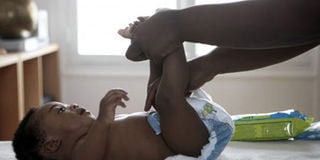Should you be worried about your child’s erection?

Ruth Nabulime* a journalist at one of the local radio stations is worried about her two-year-old son who is yet to have an erection.
She learnt about the problem from the neighbours with whom she leaves the child while going for work. Although the neighbours often talked about her child’s erection, she never took them serious. However, she admits to have never seen the boy erect whether morning or asleep.
Nabulime became more concerned when she took her son to live with his grandmother in September last year but the grandmother confirmed the same problem.
She was told
“My mother told me that my boy had not had an erection for two months.”
Apparently, the neighbours advised her to take the boy to herbalists or visit her ancestral home for a ritual. Being a staunch Anglican, she objected the advice of rituals being performed on her child
She took the boy to the family doctor who advised her to wait until the boy turns four.
Her close friend, also mother of two boys had told her that waiting for that would worsen the problem, arguing that it needs immediate attention.
“Some neighbours have brought me some herbal concoctions. However, I still fear to give them to my child since I don’t know their authenticity,” Nabulime says.
This mother is currently confused. She is in between deciding whether to take the child to herbalists or wait for the doctor’s advice. Yet again, she has no assurance that the child’s condition would improve in future basing on the fact that all her child’s age mates erect.
Psychologist view
Nicholus Ngabirano, a counselling psychologist at Uganda Counsellors’ Association (UCA), believes Nabulime has no reason to worry because her child is very young. Citing an example of his neighbour’s child who had first erection at eight years, Ngabirano says a parent would worry about child’s erection at least at five years.
“True, some children get erections even when they are below one year. However, parents need to understand that our bodies are different and sexual development greatly differs.”
Ngabirano adds that some children may be fast in growth while others may delay. However, she advises the mother to visit a child specialist to address her doubts. But also cautions against giving herbal concoctions to young children.
What it means
Dr Harriet Ajilong, a paediatrician at Children Hospital in Bugolobi, says sexual development begins at quite an early age. All children from babies to primary school pupils grow both bodily and sexually in different ways. Child erection may happen when they are given a bath or their diapers are being changed. It is not uncommon and is not a cause for concern.
Erection is common among infants and toddlers. Besides the erection you may notice that your baby’s penis is oddly large in the first days when he is born. This is due to maternal birth hormones and the trauma of birth. The organ usually shrinks in a few days.
Frequently initial erections come for no reason at all. They are mostly perhaps just unrestrained reactions, like startling or fascinating, and simply indicate that the child’s nervous system is working well.
Erection could also mean that the boy’s bladder is full and he needs to pee. In some instances intermittent erections in young boys could be a result of constipation.
“If you realise that your baby boy likes touching and chafing his penis, trying to get an erection, you don’t need to burden. This is a perfectly usual child’s behaviour. The boy will abandon this habit sooner or later,” says Dr Ajilong.
Boys usually start in early childhood. Many feel uncomfortable when the erections are strong and last for a while. In such cases, as they are not used to this kind of feeling, they sense something abnormal, so they complain or cry out in pain.
Caution
If your child’s erection lasts for more than a few hours or if you notice other rare symptoms like rash, fever or discoloured skin, you should take the boy to the paediatrician immediately. The medic will assess the child’s erection and will prescribe the best treatment.
“Parents should avoid treating children with herbal medicines especially those bought from herbalists who have not be accredited by National Drug Authority,” cautions Dr Ajilong.
Expert take
Painful erections, unrelated to sexual stimulation or desire, is a condition called priapism. Priapism, though, usually occurs only with adult men or boys between 5-10 years of age, suffering from sickle cell disease, leukaemia, and trauma to the penis, pelvis or perineal area usually due to child abuse.
Such painful erection is a true urologic emergency that may lead to permanent erectile or penile dysfunction if left untreated. In case your son has episodes of prolonged and painful erections, you had better consult a doctor to suggest a proper treatment.
But when your child does not have an erection as fast as his colleagues, it should not be a matter of concern since sexual growth differs.
However, it is vital to take the child for a thorough medical check-up so that all the health loopholes can be addressed at an early stage, advises Dr Harriet Ajilong.




